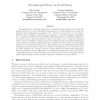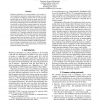13 search results - page 1 / 3 » Strategic voting when aggregating partially ordered preferen... |
ATAL
2006
Springer
13 years 8 months ago
2006
Springer
Preferences of a single agent are often partially ordered. For example, it may be hard to compare a novel with a biography. In such a situation, the agent may want the novel and t...
CORR
2011
Springer
12 years 8 months ago
2011
Springer
We consider manipulation problems when the manipulator only has partial information about the votes of the nonmanipulators. Such partial information is described by an information...
AAAI
2004
13 years 6 months ago
2004
We consider from a computational perspective the problem of how to aggregate the ranking preferences of a number of alternatives by a number of different voters into a single cons...
TARK
2005
Springer
13 years 10 months ago
2005
Springer
The aggregation of conflicting preferences is an important issue in human society and multiagent systems. Due to its universality, voting among a set of alternatives has a centra...
CORR
2002
Springer
13 years 4 months ago
2002
Springer
Preference elicitation is a central problem in AI, and has received significant attention in single-agent settings. It is also a key problem in multiagent systems, but has receive...


